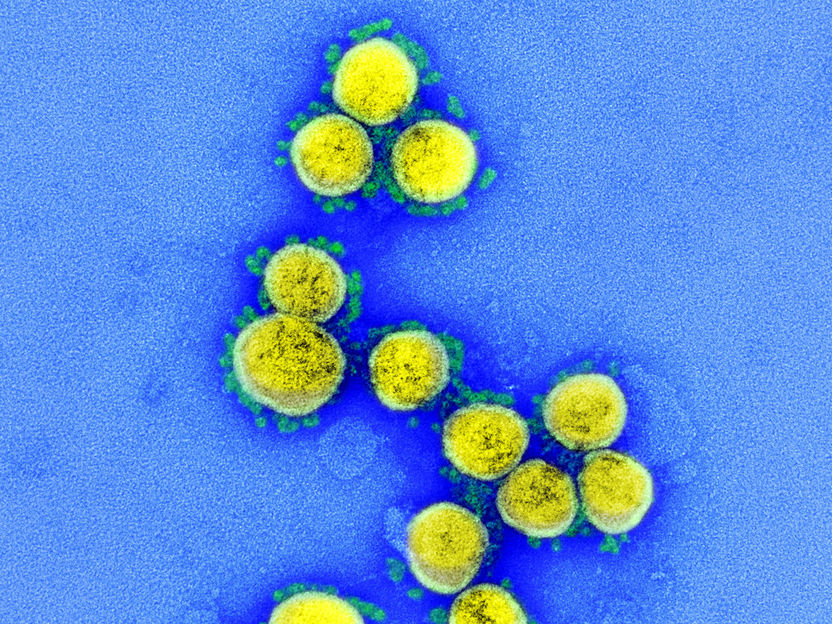New SARS-CoV-2 neutralizing antibody enters clinical phase
Advertisement
Cologne University Hospital (UKK), University of Marburg (UMR), the German Center for Infection Research (DZIF) and Boehringer Ingelheim announced the initiation of Phase 1/2a clinical investigation of BI 767551, a new SARS-CoV-2 neutralizing antibody. By combining UKK, UMR and DZIF’s expertise in virology, immunology and clinical investigation with Boehringer Ingelheim’s expertise in developing and manufacturing therapeutic antibodies, the partners developed BI 767551 as a potential new therapeutic and preventive/prophylactic option for fighting Covid-19.

Transmission electron micrograph of SARS-CoV-2 virus particles.
NIAID
Virus neutralizing antibodies are expected to become an important line of defense against SARS-CoV-2, complementing vaccines and nonpharmaceutical interventions. They are being investigated as a therapy option for individuals with mild or severe infections, but also as prevention or prophylaxis in non-infected people with a high risk of infection or at risk of serious outcomes. Directly delivering BI 767551 to the lung by inhalation has the potential to provide fast acting protection from virus infection in the respiratory tract.
The new antibody BI 767551 was derived from blood samples of recovered COVID-19 patients at UKK, examined for SARS-CoV-2 neutralization at UMR and developed further in collaboration with Boehringer Ingelheim. The clinical study will be led by Prof. Florian Klein and Prof. Gerd Fätkenheuer at UKK and Boehringer Ingelheim will supply the antibody. “With BI 767551, we aim to provide an effective option for preventing and treating COVID-19,” explains Prof. Florian Klein, Director of the Institute for Virology at the Cologne University Hospital and Principal Investigator at the DZIF.
”Monoclonal antibodies are a promising component in the fight against new viruses, such as the SARS-CoV-2. If this antibody turns out to be effective against COVID-19, this finding could be helpful in the current and also in future epidemics and pandemics. I am glad that we are able to assist in the development of this compound," says Prof. Stephan Becker, Director of the Institute of Virology at University of Marburg and Coordinator Emerging Infections, DZIF.
“We are excited to contribute to the development of BI 767551 in collaboration with our partners, with the aim to provide an innovative SARS-CoV-2 neutralizing antibody, combining a systemic with an inhaled route of administration” said Michel Pairet, member of Boehringer Ingelheim’s Board of Managing Directors with responsibility for the company’s Innovation Unit.
The Phase 1/2a studies (NCT04631705, NCT04631666) will evaluate the safety, pharmacokinetics and antiviral activity of the antibody. In Phase 1, the antibody will be administered to participants either with a single infusion or a single inhalation. If the antibody is well tolerated, late-stage confirmatory studies will be conducted.
Other news from the department science
Most read news
More news from our other portals
See the theme worlds for related content
Topic world Antibodies
Antibodies are specialized molecules of our immune system that can specifically recognize and neutralize pathogens or foreign substances. Antibody research in biotech and pharma has recognized this natural defense potential and is working intensively to make it therapeutically useful. From monoclonal antibodies used against cancer or autoimmune diseases to antibody-drug conjugates that specifically transport drugs to disease cells - the possibilities are enormous

Topic world Antibodies
Antibodies are specialized molecules of our immune system that can specifically recognize and neutralize pathogens or foreign substances. Antibody research in biotech and pharma has recognized this natural defense potential and is working intensively to make it therapeutically useful. From monoclonal antibodies used against cancer or autoimmune diseases to antibody-drug conjugates that specifically transport drugs to disease cells - the possibilities are enormous

















































